
- Subject:
- Composition and Rhetoric
- Education
- English Language Arts
- Material Type:
- Homework/Assignment
- Provider:
- CUNY Academic Works
- Provider Set:
- Hostos Community College
- Author:
- Lundberg, Karin
- Date Added:
- 01/01/2020



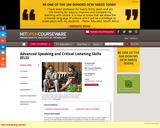
For advanced students who wish to build confidence and skills in spoken English. Focuses on the appropriate oral presentation of material in a variety of professional contexts: group discussions, classroom explanations and interactions, and theses/research proposals. Valuable for those who intend to teach or lecture in English. Includes language laboratory assignments. The goal of the workshop is to develop effective speaking and listening skills for academic and professional contexts.
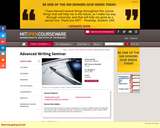
Provides the opportunity for students to work intensively on developing the research claims and arguments in their writing. Open to both Master's and Ph.D. students and designed to maximize cross-fertilization between programs and research areas. First part devoted to reading and writing assignments that guide students in focusing on the connections between their research claims, the evidence that supports those claims, and the reasoning that underlies that support. In the latter part, students provide successive drafts of their project for group commentary and guidance in revision. The purpose of this seminar is to expose the student to a number of different types of writing that one may encounter in a professional career. The class is an opportunity to write, review, rewrite and present a point of view both orally and in written form.

This assignment will help students of English Composition II to construct an annotated bibliography as a precursor to a research paper.
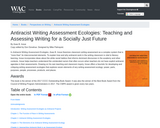
In Antiracist Writing Assessment Ecologies, Asao B. Inoue theorizes classroom writing assessment as a complex system that is "more than" its interconnected elements. To explain how and why antiracist work in the writing classroom is vital to literacy learning, Inoue incorporates ideas about the white racial habitus that informs dominant discourses in the academy and other contexts. Inoue helps teachers understand the unintended racism that often occurs when teachers do not have explicit antiracist agendas in their assessments. Drawing on his own teaching and classroom inquiry, Inoue offers a heuristic for developing and critiquing writing assessment ecologies that explores seven elements of any writing assessment ecology: power, parts, purposes, people, processes, products, and places.
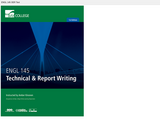
Online OER text adapted for use in ENGL 145 - ENGL 145 Technical and Report Writing by Amber Kinonen for Bay College.
© 2017 Bay College and Content Creators. Except where otherwise noted this work is licensed under the Creative Commons Attribution 4.0 International License. To view a copy of this license, visit http://creativecommons.org/licenses/by/4.0/.

Beyond Argument offers an in-depth examination of how current ways of thinking about the writer-page relation in personal essays can be reconceived according to practices in the care of the self — an ethic by which writers such as Seneca, Montaigne, and Nietzsche lived. This approach promises to reinvigorate the form and address many of the concerns expressed by essay scholars and writers regarding the lack of rigorous exploration we see in our students' personal essays — and sometimes, even, in our own. In pursuing this approach, Sarah Allen presents a version of subjectivity that enables productive debate in the essay, among essays, and beyond.
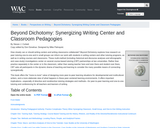
How closely can or should writing centers and writing classrooms collaborate? Beyond Dichotomy explores how research on peer tutoring one-to-one and in small groups can inform our work with students in writing centers and other tutoring programs, as well as in writing courses and classrooms. These multi-method (including rhetorical and discourse analyses and ethnographic and case-study) investigations center on several course-based tutoring (CBT) partnerships at two universities. Rather than practice separately in the center or in the classroom, rather than seeing teacher here and tutor there and student over there, CBT asks all participants in the dynamic drama of teaching and learning to consider the many possible means of connecting synergistically.
This book offers the "more-is-more" value of designing more peer-to-peer learning situations for developmental and multicultural writers, and a more elaborate view of what happens in these peer-centered learning environments. It offers important implications—especially of directive and nondirective tutoring strategies and methods—for peer-to-peer learning and one-to-one tutoring and conferencing for all teachers and learners of writing.
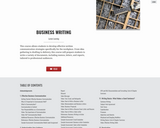
This course allows students to develop effective written communication strategies specifically for the workplace. From idea gathering to drafting to delivery, this course will prepare students to write a variety of documents, including memos, letters, and reports, tailored to professional audiences.
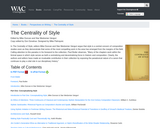
In The Centrality of Style, editors Mike Duncan and Star Medzerian Vanguri argue that style is a central concern of composition studies even as they demonstrate that some of the most compelling work in the area has emerged from the margins of the field. Calling attention to this paradox in his foreword to the collection, Paul Butler observes, "Many of the chapters work within the liminal space in which style serves as both a centralizing and decentralizing force in rhetoric and composition. Clearly, the authors and editors have made an invaluable contribution in their collection by exposing the paradoxical nature of a canon that continues to play a vital role in our disciplinary history."

This is a syllabus for a zero-textbook-cost section of City College's English 11000, a first-year composition course.
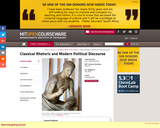
"This course is an introduction to the history, theory, practice, and implications of rhetoric, the art and craft of persuasion throughAnalyzing persuasive texts and speechesCreating persuasive texts and speechesThrough class discussions, presentations, and written Assignments and Labs, you will get to practice your own rhetorical prowess. Through the readings, you'll also learn some ways to make yourself a more efficient reader, as you turn your analytical skills on the texts themselves. This combination of reading, speaking, and writing will help you succeed in:learningto read and think criticallytechniques of rhetorical analysistechniques of argumentto enhance your written and oral discourse with appropriate figures of speechsome techniques of oral presentation and the use of visual aids and visual rhetoric."

In this lesson, students use three artifacts from the Community College 7 collection of the CUNY Digital History Archive that relate to the Bedford-Stuyvesant-based community movement of the late 1960s for a public college for the Black and Puerto Rican youth of central Brooklyn, a movement which led to the establishment of Medgar Evers College. The purpose of this lesson is for students to explore and practice strategies that community activists and organizers use to engage others in social justice issues that they feel are important and demand action. As they do so, students learn how, during the racial justice and freedom struggles of the mid-1960s and early 1970s, New York City college students and youth took action to shape the City University of New York.This lesson plan was created by Juilet Young, a doctoral student in the Ph.D. Program in Urban Education at the CUNY Graduate Center, for the CUNY Digital History Archive in Spring 2022.
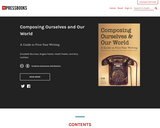
This textbook is meant for first year English Composition Courses. The text covers the essentials of composition and rhetoric in a recursive manner and introduces research skills.
When you are eager to get started on the coursework in your major that will prepare you for your career, getting excited about an introductory college writing course can be difficult. However, regardless of your field of study, honing your writing skills—and your reading and critical-thinking skills—gives you a more solid academic foundation.
In college, academic expectations change from what you may have experienced in high school. The quantity of work you are expected to do is increased. When instructors expect you to read pages upon pages or study hours and hours for one particular course, managing your work load can be challenging.
The quality of the work you do also changes. It is not enough to understand course material and summarize it on an exam. You will also be expected to seriously engage with new ideas by reflecting on them, analyzing them, critiquing them, making connections, drawing conclusions, or finding new ways of thinking about a given subject. Educationally, you are moving into deeper waters. A good introductory writing course will help you swim.
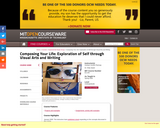
In this interdisciplinary seminar, we explore a variety of visual and written tools for self exploration and self expression. Through discussion, written assignments, and directed exercises, students practice utilizing a variety of media to explore and express who they are.
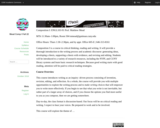
Composition I is a course in critical thinking, reading and writing. It will provide a thorough introduction to the writing process and academic discourse: generating ideas, developing a thesis, supporting a thesis with evidence, and revising and editing. Students will be introduced to a variety of research resources, including the NYPL and CUNY library systems and learn basic research techniques. Because good writing starts with good reading, attention will be paid to critical reading strategies.
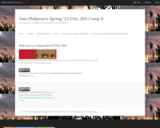
The purpose of this course is to enhance students' abilities to write in different genres, with an
emphasis on developing a project involving research for a real-world audience. With readings
and writing assignments drawn from a range of disciplines, the course prepares students for
writing in a variety of contexts and supports their developing strategies for writing in various
genres. The course will also further develop elements of the writing
process: generating ideas, developing a thesis, supporting a thesis with evidence, seeking and
receiving feedback on work in progress, and revising and editing.

First-year composition courses at CCNY teach writing as a recursive and frequently
collaborative process of invention, drafting, and revising. Writing is both personal and social, and students should learn how to write for different purposes and audiences. Since writing is a process of making meaning and communicating, FYC teachers respond mainly to the content of students’ writing as well as to recurring surface errors. Students should expect frequent written and oral responses on the content of their writing from their teachers and peers. Classes rely heavily on a workshop format. Instruction emphasizes the connection between writing, reading, and critical thinking; students should give thoughtful, reasoned responses to the readings. Both reading and writing are the subjects of class discussions and workshops, and students are expected to be active participants in the online classroom community.